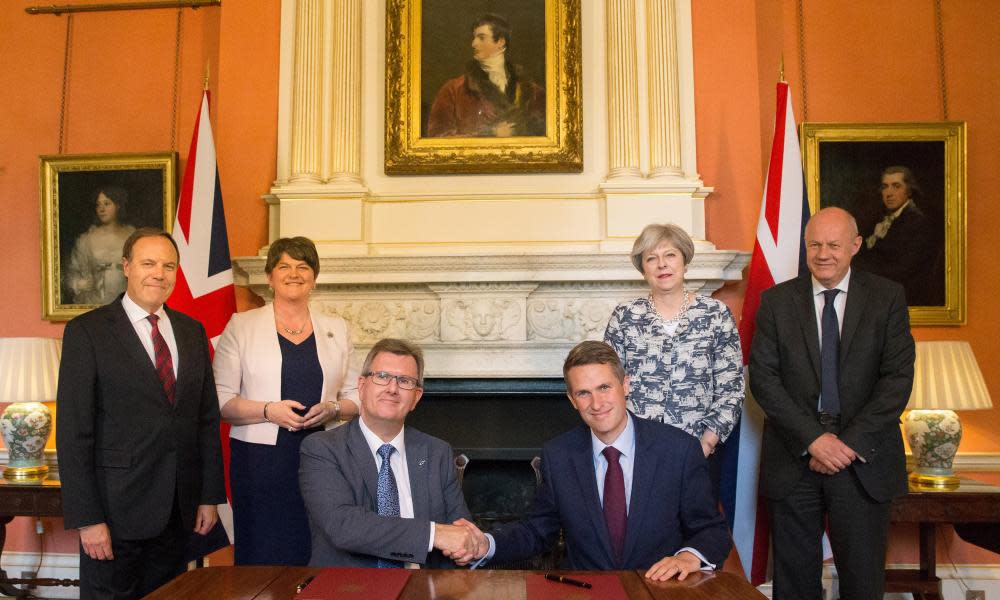The Conservative/DUP deal: what it says and what it means

The Conservative/DUP deal is intended to serve three functions: to keep the Tories in power; to ensure that Brexit gets through Parliament; and to get the Northern Ireland power-sharing agreement back on track.
The deal says:
Agreement between the Conservative and Unionist party and the Democratic Unionist party on support for the government in parliament
It means: “We are all Unionists and already had much in common; this deal is a natural progression between old friends.” (Let’s overlook the awkward fact that the Tories are dumping their more centrist colleagues in the Ulster Unionist party.)
The deal says:
The DUP agrees to support the government on all motions of confidence; and on the Queen’s speech; the Budget; finance bills; money bills, supply and appropriation legislation and estimates … the DUP also agrees to support the government on legislation pertaining to the UK’s exit from the EU and legislation pertaining to national security.”
It means: Brexit, the economy and defence will be the Conservative government’s agenda for the rest of this parliament; hopes for other legislation on other parts of the Tory manifesto are a wish list.
The deal says:
Support on other matters will be agreed on a case-by-case basis.
It means: a signal to concerned liberal Tory MPs who are proud of the party’s decision to back gay marriage that the DUP will definitely not be dictating terms on social issues.
The deal says:
A coordination committee [to ensure the deal works] will be convened for this purpose chaired by the government. The parties will agree the modus operandi of this committee. The Northern Ireland secretary will not sit on this committee.
It means: James Brokenshire, the Northern Ireland secretary, will not be involved, which should deflect accusations that he is partisan when negotiating between unionists, nationalists, loyalists and republicans.
The deal says:
Both parties have agreed that there will be no change to the pension triple lock and the universal nature of the winter fuel payment.
It means: the Tories get it and are willing to pay: the number of elderly people in Northern Ireland is growing dramatically and the province is colder than most of the UK. Dropping proposals for a means-tested winter fuel payment means the DUP can take credit for a change that will almost certainly change Tory policy across the UK.
The deal says:
The agreement reached will remain in place for the length of the parliament and can be reviewed by mutual consent of both parties.
It means: if Theresa May or Arlene Foster are ditched by their respective parties, this deal will survive. But if, in two years, the Tories remain frightened by the possibility of another election, the “mutual consent” clause gives the DUP an opportunity to ask for more money.
The deal says:
Signed by Gavin Williamson
It means: Tory chief whip Williamson’s signature is a sign that the whips’ office has been a driving force behind the deal, which they hope will keep MPs in line and voting with the government. His signature is also proof, if needed, of his growing influence on No 10 since the resignations of May’s advisers Nick Timothy and Fiona Hill.

 Yahoo News
Yahoo News 
